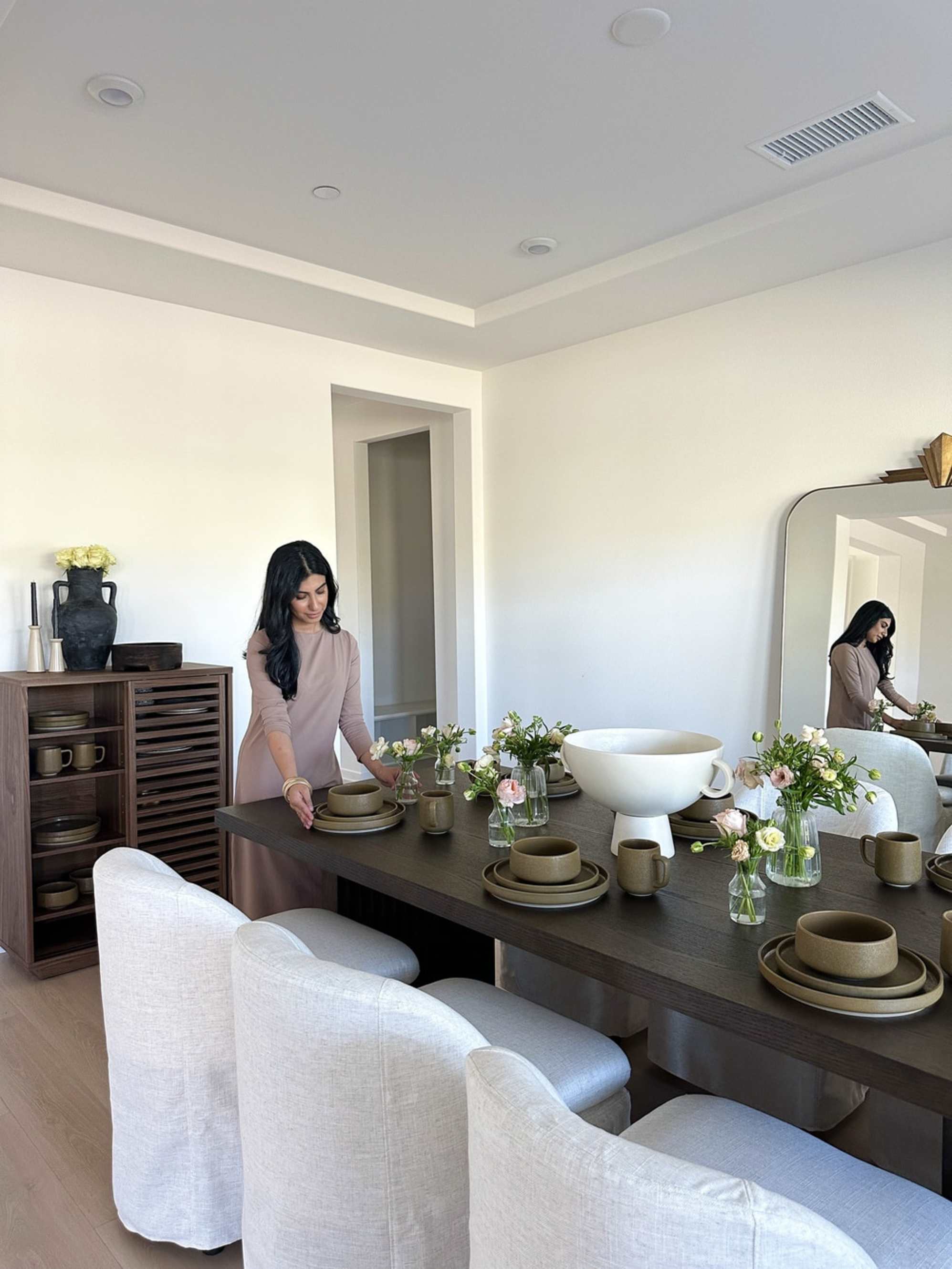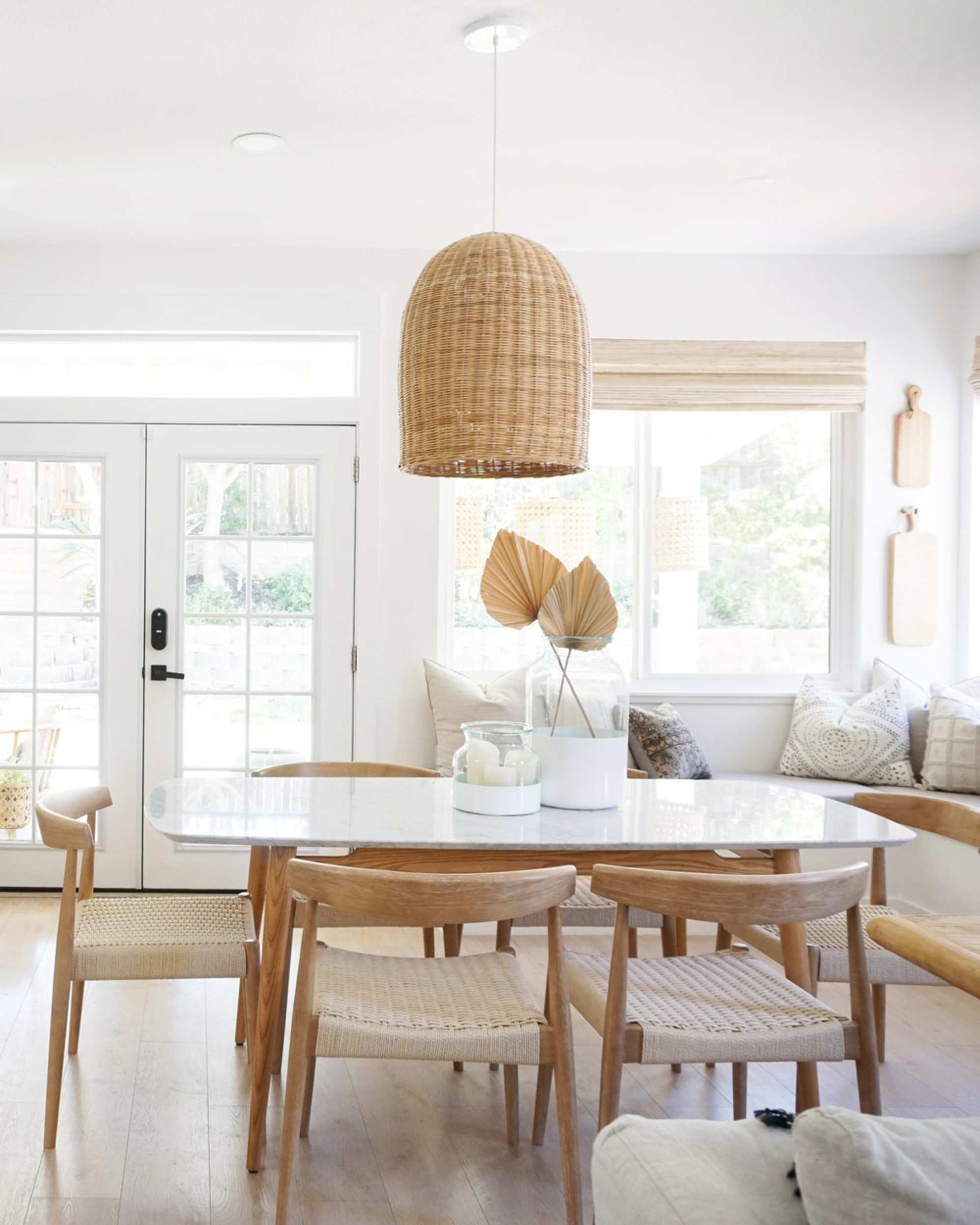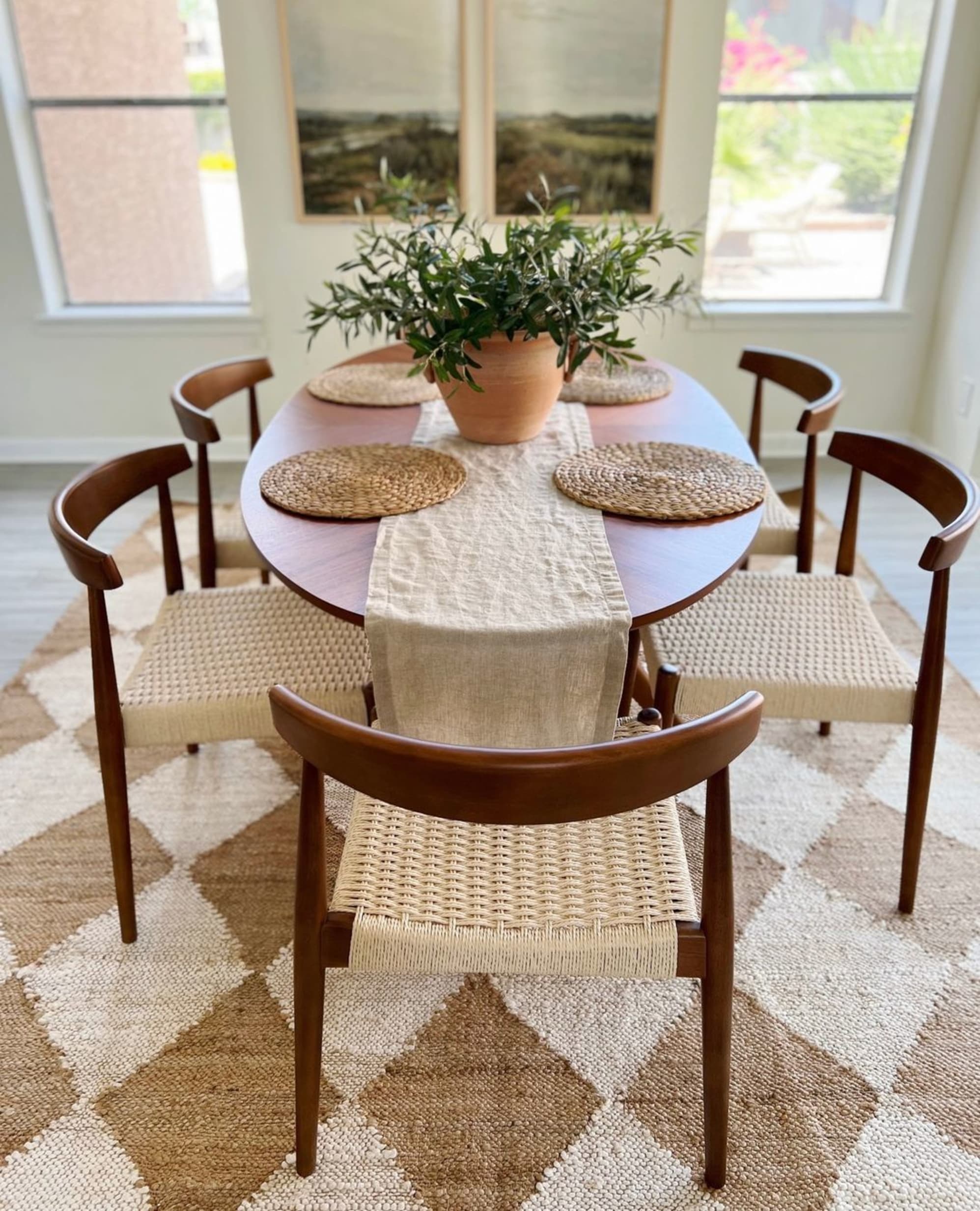
12 Feng Shui Dining Room Tips You Can't Ignore
Your dining room is more than just a place to eat; it's a gathering spot, the heart of your home where you share meals and create memories with family and friends. And since the dining room holds such significance in our lives, it's worth considering how we can enhance its energy and create a truly harmonious and welcoming space.
That's where the principles of Feng Shui come in. By doing something as simple as choosing the right dining table or changing the dining room layout, you can enhance the energy flow in the space.
Let’s look at some expert tips from Feng Shui Consultant Joey Yap that you can incorporate into your dining room today.
Joey Yap is the founder of the Mastery Academy of Chinese Metaphysics and Chief Consultant of the Joey Yap Consulting Group. He is an authority in Chinese metaphysics and a prolific author of 186 books and counting.
What is Feng Shui?
Feng Shui, an ancient Chinese practice, focuses on harmonising individuals with their surrounding environment. The philosophy translates literally to “wind-water” and its origins are rooted in observing nature.
Feng Shui is a complex system that considers time, space and the flow of energy (chi) to create balance and invite positive energy into your home, and life.
Why follow Feng Shui dining room rules?
Despite initial skepticism regarding Feng Shui, many people have seen benefits from following simple Feng Shui principles. That’s why it’s still being practiced today, and not just by the Asian community.
“Feng Shui has a basis in the principles of design, architecture, and environmental psychology. When applied thoughtfully to the dining room, it can create a more harmonious and balanced space,” says Joey.
Let’s take a look at some reasons why Feng Shui in the dining room is so important:
Promotes good energy flow
Feng Shui is all about creating balance and chi in your environment. By simply rearranging the furniture and layout of your dining room, you can create a space that promotes good energy flow, which can have a positive impact on your overall well-being.
Enhances the dining experience
A dining room that is designed according to Feng Shui principles can create a relaxing and welcoming atmosphere that enhances the dining experience. When the energy in the room is balanced, you and your guests can feel more comfortable and at ease, which can make your meals more enjoyable.
Boosts your mood
Likewise, Feng Shui rules can help boost the mood of you and your guests. The colours, lighting, and overall ambiance of your dining room can create a space that is calming and relaxing.
Attracts abundance and prosperity
In Feng Shui, the dining room is associated with abundance and prosperity as you’re nourishing the body with food. By creating a dining room that promotes good energy flow and balances the elements, you can attract positive energy and increase your chances of abundance and prosperity.
Feng Shui dining room layout
According to Feng Shui principles, certain arrangements can promote harmony, balance, and positive energy, while others can hinder the flow and create a sense of disharmony.
“The typical Feng Shui dining room layout ensures that no one’s back is facing a door or window,” says Joey. This is because having a solid wall behind you while dining provides a sense of support and security.
Also, avoid positioning your dining table directly in line with the door, as this can create a "chi rush" that disrupts the flow of energy. Instead, aim for a diagonal or offset placement that allows for a more gentle and harmonious flow of chi.
Here’s what an ideal Feng Shui dining room layout would look like:
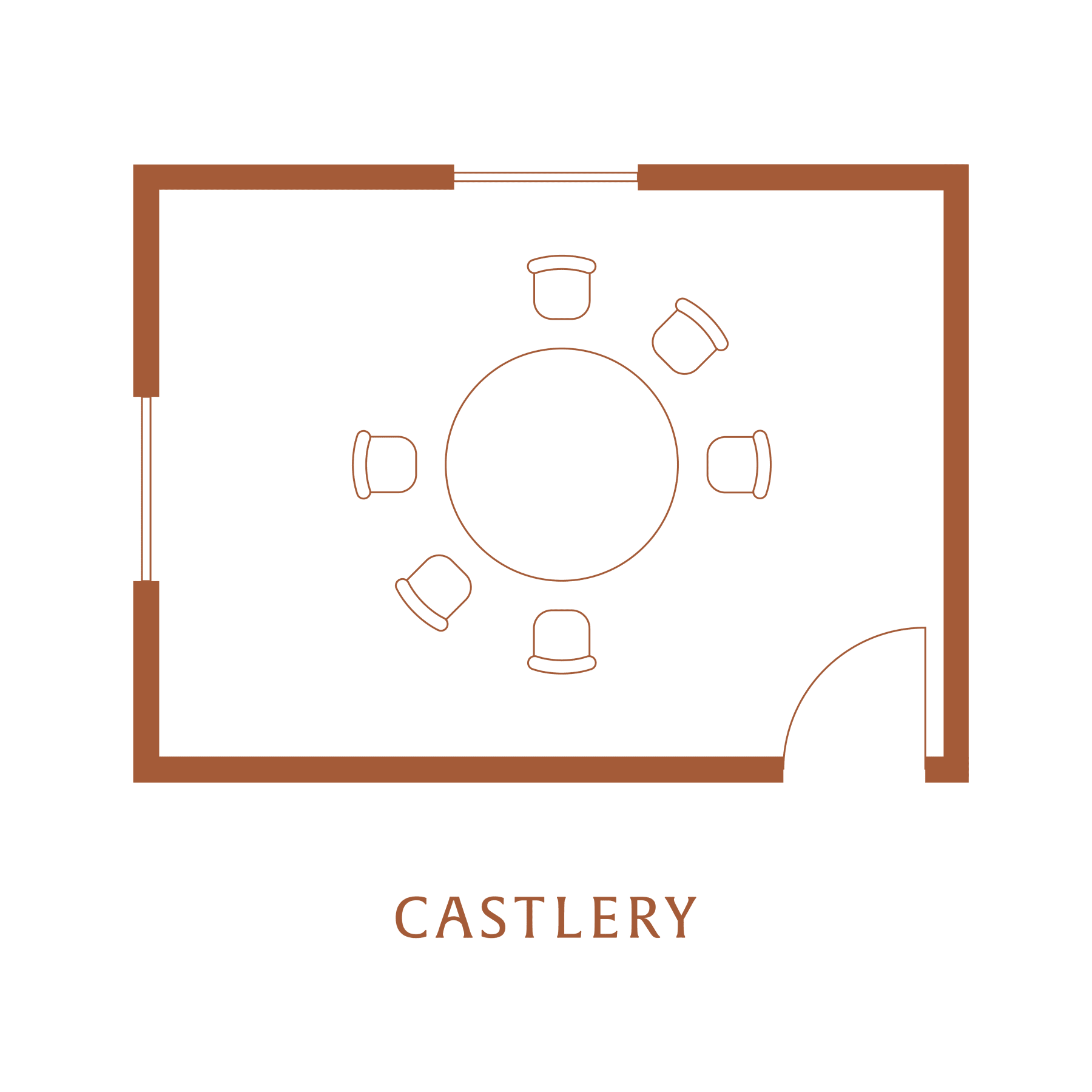 An ideal Feng Shui dining room layout.
An ideal Feng Shui dining room layout.
Dining room Feng Shui tips
1. Choose a round-edged dining table
When choosing a table for your dining room, Joey recommends picking one that has a rounded edge. Based on Feng Shui principles, round or oval dining tables help to soften the energy in the room, creating a welcoming atmosphere.
The Brighton Oval Dining Table Set
Picture credits: @designbyjive
The Brighton Oval Dining Table Set
Picture credits: @designbyjive

The Theo Round Dining Table
Picture credits: @helendriscoll
The Theo Round Dining Table
Picture credits: @helendriscoll
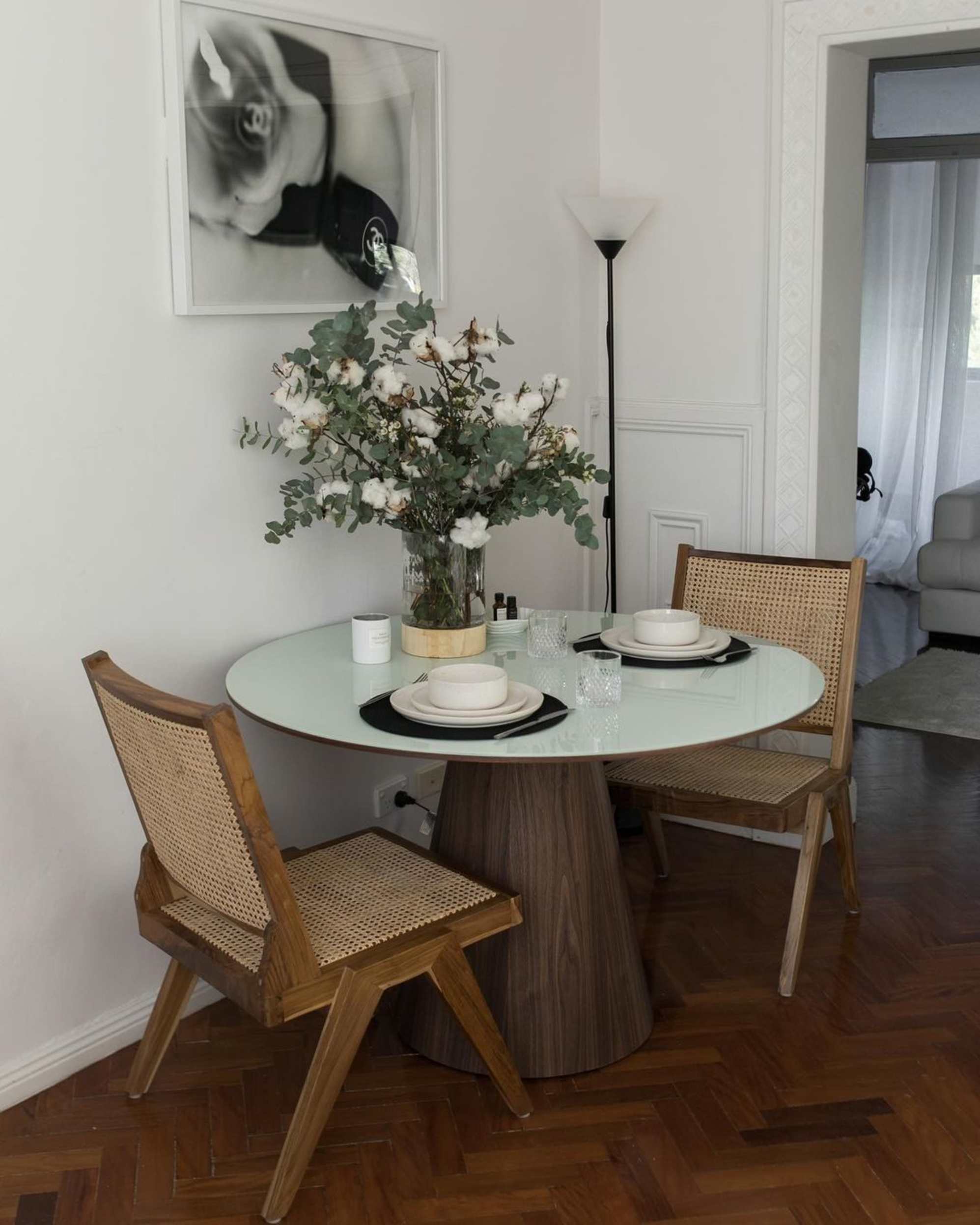
Sharp or pointy edges on dining tables are not recommended as they create negative energy or ‘Poison Arrows’ that can disrupt the flow of chi. Shapes with sharp corners are believed to create tension and stress, making it difficult for people to relax and enjoy their meals.
“If you have a rectangular or square table, you can soften the edges by placing a tablecloth or a runner on top,” says Joey.
Recommended read: Round or Rectangular? How to Pick the Right Shape of Dining Table for Your Home
2. Opt for a wooden dining table
Solid wood dining tables are believed to create positive energy and growth as wood is a natural element.
“Having wooden tables introduces the Wood element into your space, which is psychologically calming and provides a sense of stability.”
The Vincent Dining Table
Picture credits: @amandaorr
The Vincent Dining Table
Picture credits: @amandaorr
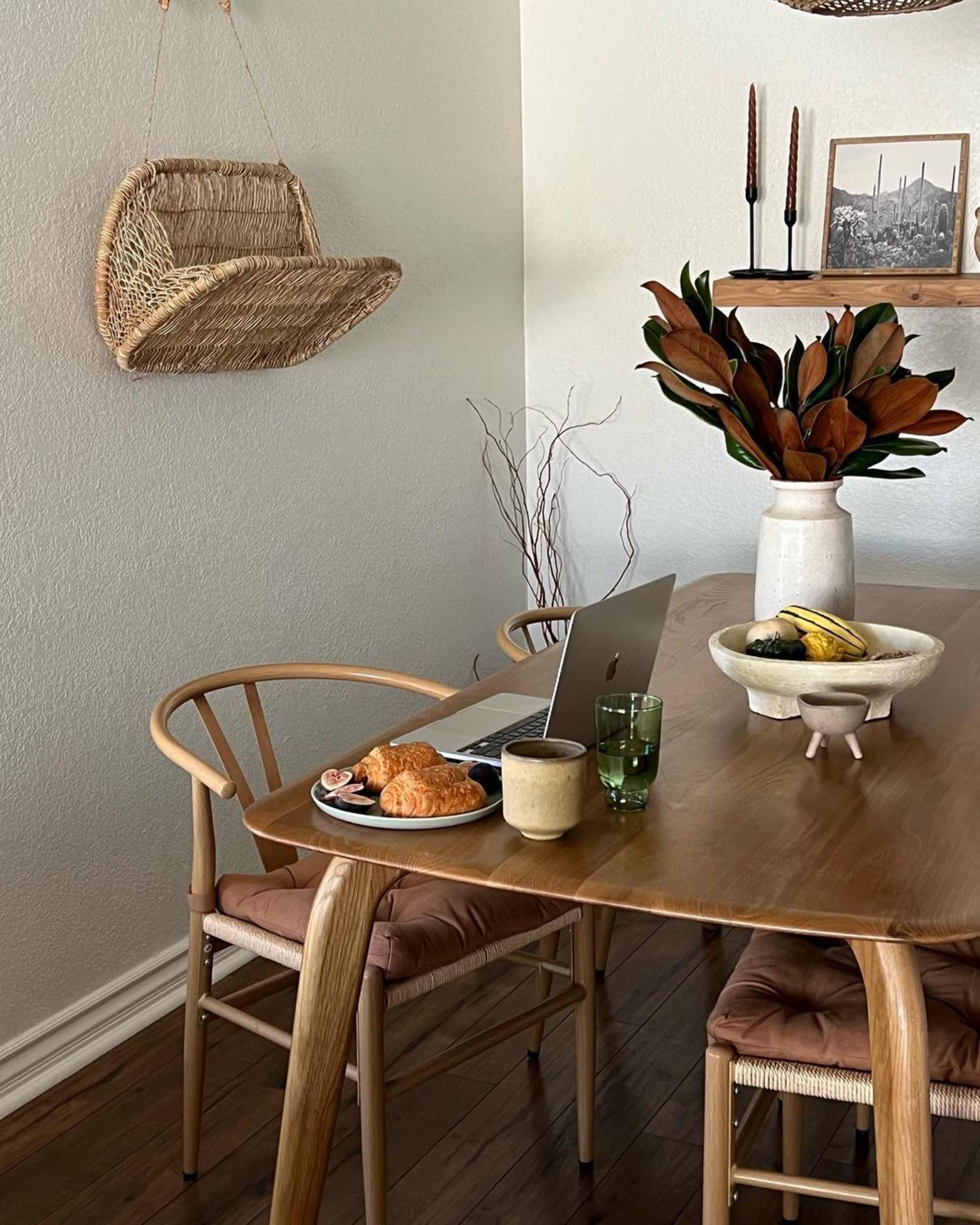
The Sawyer Dining Table
Picture credits: @twopotatoesinasack
The Sawyer Dining Table
Picture credits: @twopotatoesinasack
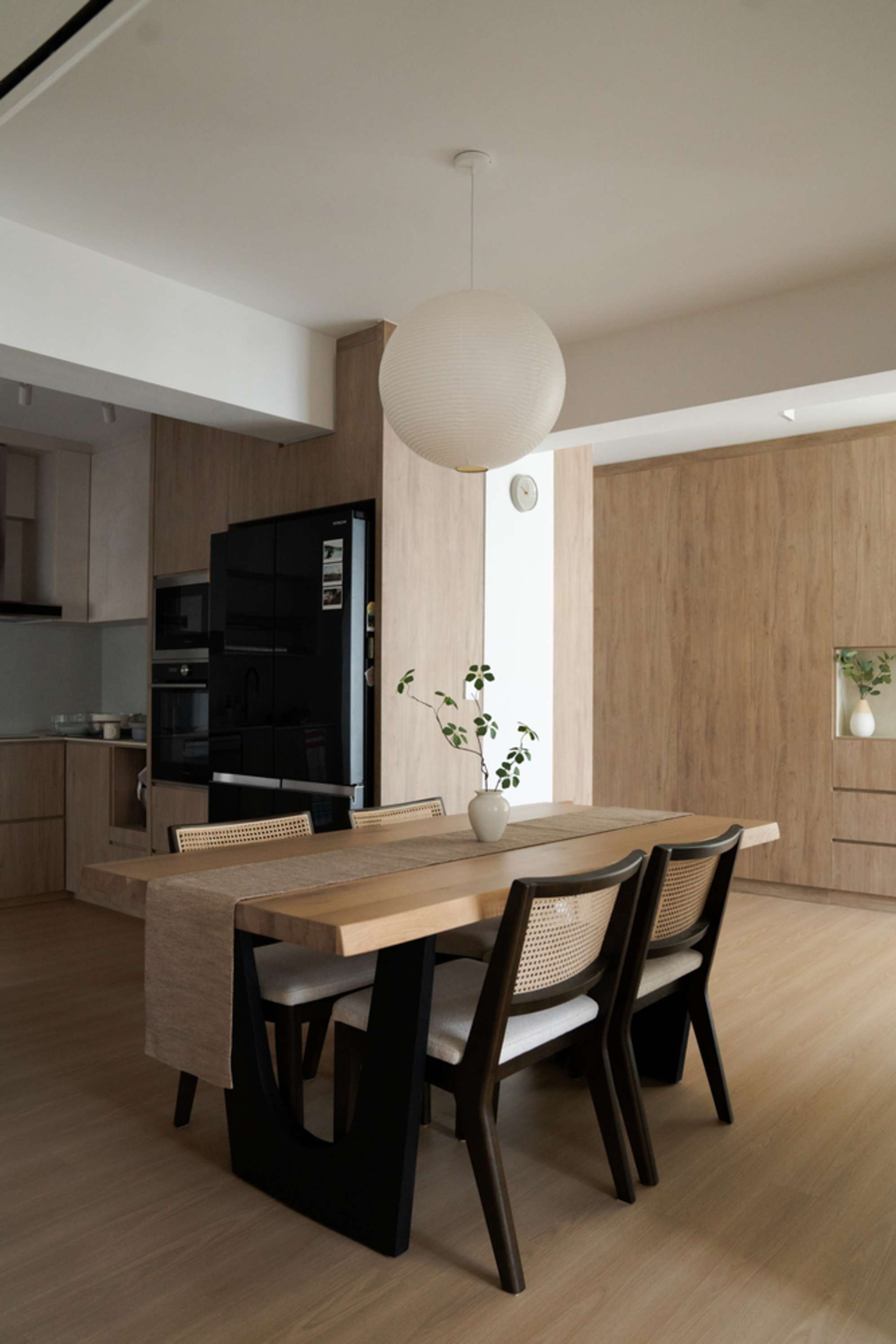
To add on, wooden dining tables are aesthetically pleasing and can gel well with any interior design.
When looking for a wooden dining table, make sure to opt for high-quality solid woods, such as teak, walnut, or mahogany.
3. Avoid glass table tops
While glass dining tables are trendy and minimalistic, they are believed to be inauspicious as they harbour negative chi when used in the dining area, creating a feeling of uneasiness and sensitivity.
Plus, there's also the practical aspect to consider. “When compared to materials like wood, glass is more fragile and delicate, which warrants constant care,” warns Joey.
4. Use soft lighting
Lighting is another essential element in Feng Shui, and it can be used to set the mood in your dining room. Use soft lighting to create a warm and inviting atmosphere, and avoid harsh overhead lighting that can create a sense of tension. Consider using candles or dimmer switches to create a comfortable and relaxing ambiance.
5. Ensure your dining table is big enough
“If you’re one to host large groups, ensure that your dining table is big enough. Cramped seating at a dining table is considered inauspicious in Feng Shui as it shows that there isn’t enough abundance to go around,” he says.
“It’s also not welcoming if your guests are struggling to find a place to sit and eat.”
Ideally, you’d want the table to fit 6 to 8 people. You can opt for an extendable dining table, so you can reduce the table size when it’s just you, and extend it when you have guests over.
Recommended read: 8 Key Dining Table Measurements You Should Know About
The Seb Extendable Dining Table
Picture credits: @keepingitklinger
The Seb Extendable Dining Table
Picture credits: @keepingitklinger
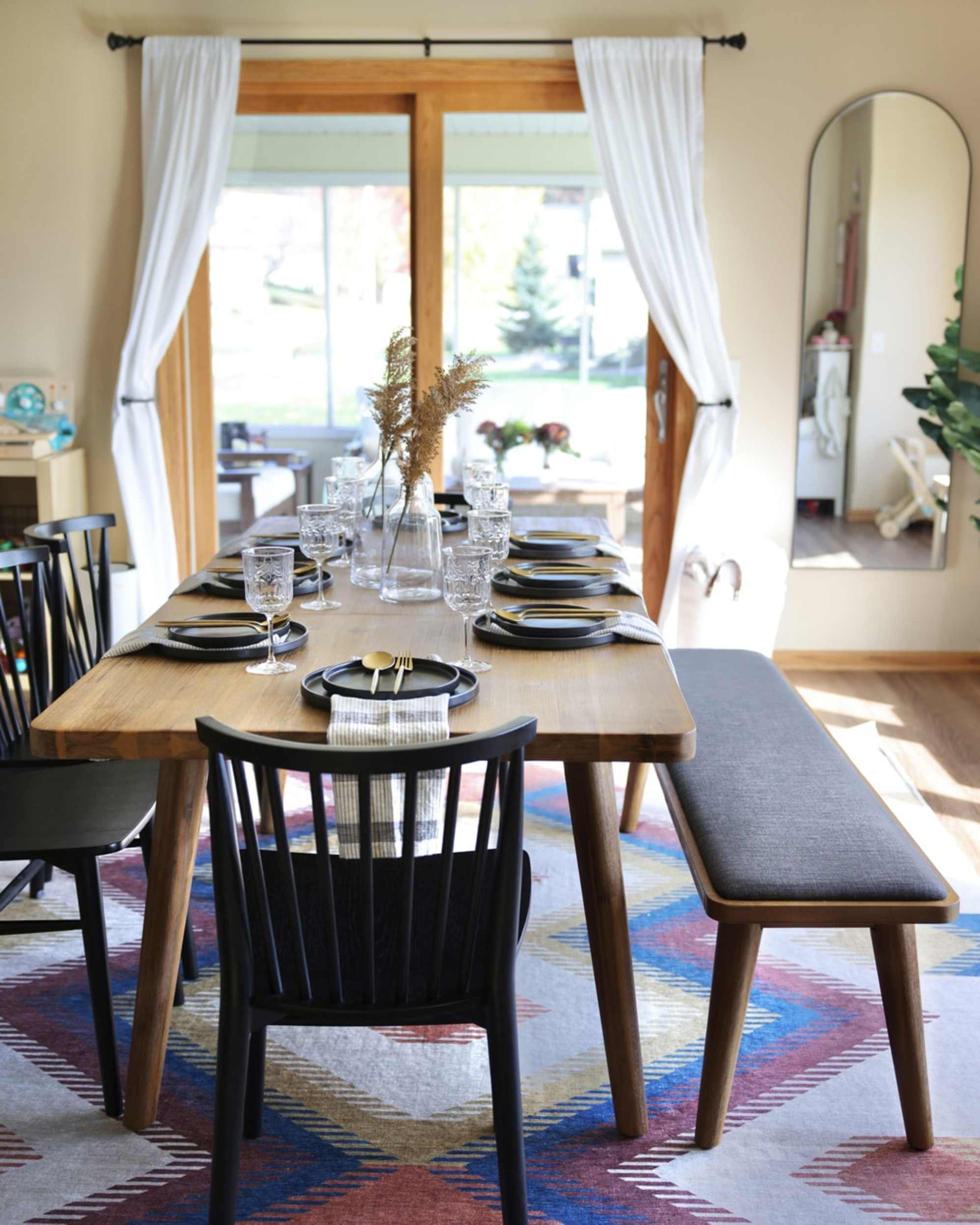
The Dillon Extendable Dining Table
Picture credits: @audreycrispinteriors
The Dillon Extendable Dining Table
Picture credits: @audreycrispinteriors
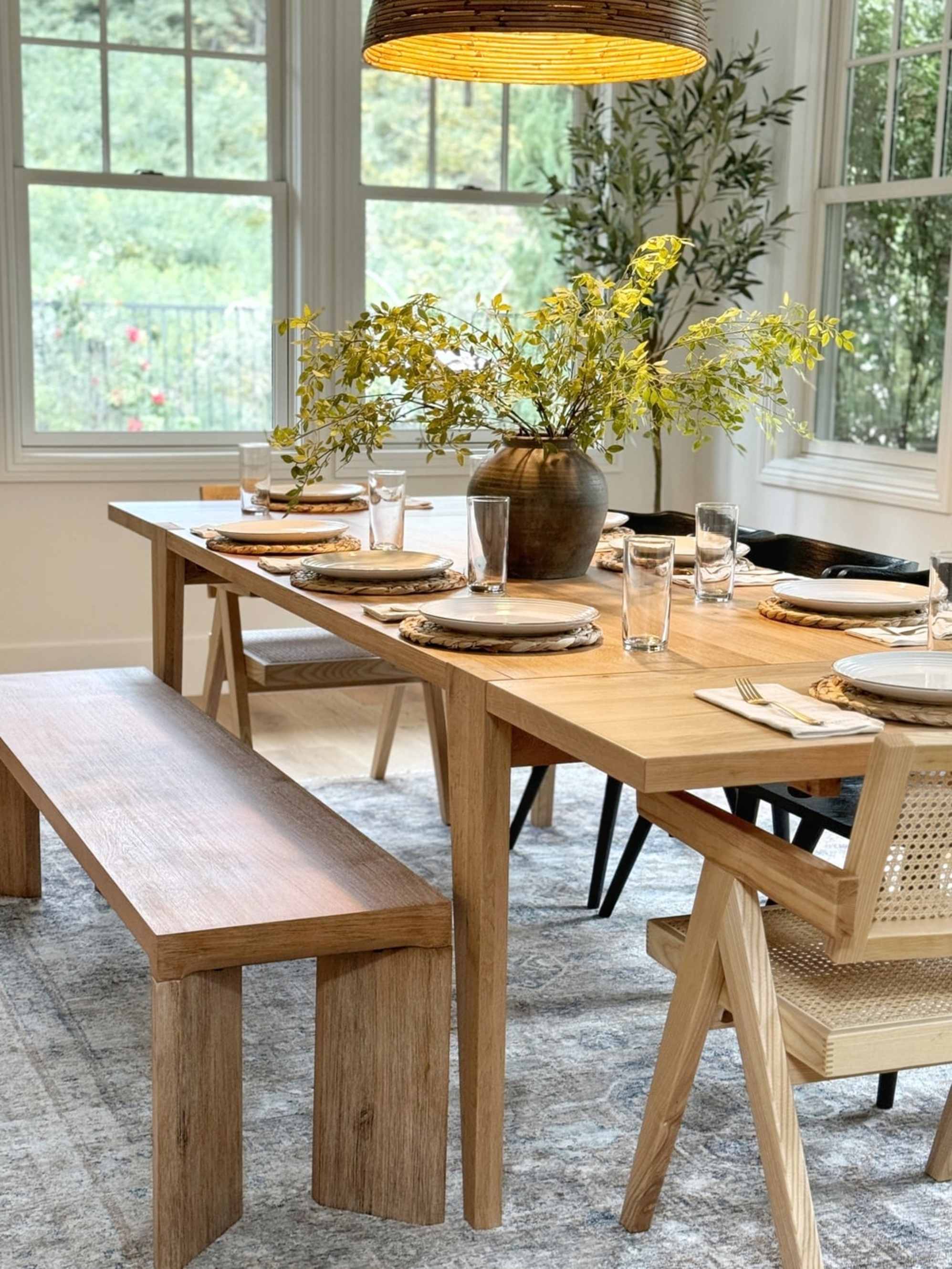
6. Keep the number of dining chairs even
In Feng Shui, even numbers are associated with balance and harmony, while odd numbers represent disruption.
“When it comes to dining chairs, using an even number creates balance and harmony in the dining room,” Joey says.
Having an odd number of modern dining chairs can create an uncomfortable feeling for your guests. For example, if you have seven chairs around a table, it can be difficult for people to interact and engage in a one-to-one conversation, as someone will always be sitting alone.
7. Position your dining table with intention
The placement of your dining table is also important in Feng Shui. Ideally, the table should be positioned in the center of the room with ample space around it. This allows for good energy flow and promotes a sense of balance in the room.
“You should also avoid positioning your table in a manner where a person’s back faces an entrance. Having a person’s back facing a door can create a sense of vulnerability and insecurity.”
8. Position the dining table near the kitchen
Ideally, position the dining area close to the kitchen without being directly in line with the kitchen door. This signifies a harmonious relationship between nourishment (kitchen) and consumption (dining). It allows for a smooth energy flow and convenience during meal preparation and serving.
“Also, ensure there is a clear and unobstructed pathway between the kitchen and dining area. This promotes a seamless flow of energy and minimises any disruptions during mealtime,” shares Joey.
9. Create balance in the dining room
Balance is essential in Feng Shui, and creating a sense of balance in your dining room is important. One way to create balance is to use symmetrical design elements in your dining room design – such as pairing objects and matching contemporary dining room sets – to create a sense of harmony and equality.
10. Keep the dining area clutter-free
This is a common rule that many Feng Shui masters will suggest for any room in the house.
“Clutter is a major obstacle to good energy flow, and it's essential to keep your dining room clutter-free,” he mentions.
Avoid using the dining table as a dumping ground for mail, homework, or other items. Instead, use a separate space for these items, and make sure that the dining table is always clear and ready for use. You can also incorporate storage solutions like sideboards or shelves to keep the dining room organised.
11. Position mirrors that face the dining table
Unlike the Feng Shui bedroom rule of not having mirrors facing your bed, the dining room embraces a different approach. In this space, you’ll want mirrors to face the dining table to reflect the food and ‘double the meal.’
“Since food symbolises abundance, ‘doubling the meal’ also means you’re doubling your abundance!”
12. Ensure that the dining table doesn’t sit under beams
Beams are considered heavy and oppressive, which can have ‘cutting’ energy. This is why placing your dining table under beams isn’t recommended, seeing as you spend great amounts of time in the dining room having meals.
If you aren’t able to move the dining table anywhere else, here are some ways to soften the visual impact of the beams:
Use a canopy
Use drapes
Paint the beams the same color as your ceiling
Install a false ceiling
Feng Shui dos and don'ts for your dining room
| Feng Shui Dos | Feng Shui Don'ts |
|---|---|
| Choose a round-edged dining table | Use glass tabletops |
| Choose a wooden dining table for positive energy | Position your table where a person’s back faces the entrance |
| Use soft lighting | Have cramped seating at a dining table |
| Position the dining table near the kitchen | Have an odd number of dining chairs |
| Create balance by pairing objects | Clutter your dining area |
| Position mirrors that face the dining table | Place the dining table under beams |
Dining with good fortune
Applying Feng Shui principles to your dining room can help you create a space that is not only beautiful but also promotes health, happiness, and prosperity. By following the tips shared in this article, you can transform your dining room into a space that nourishes the body, mind, and soul.
Frequently asked questions about Feng Shui for your dining rooms
Where is the best place to put a dining room?
Some general guidelines suggest that the dining room should be centrally located within the home, promoting a sense of balance and connection.
Avoid placing the dining room too close to the main entrance, as this can lead to a rushed and chaotic energy. Ideally, the dining room should be easily accessible from the kitchen and living room, facilitating a smooth flow of energy and encouraging social interaction.
Which direction is best for a dining room?
Some Feng Shui practitioners recommend east-facing dining rooms to promote health and family harmony, while west-facing dining rooms are believed to enhance creativity and social connections.
South-facing dining rooms can be associated with recognition and reputation, while north-facing dining rooms may promote career success.
Ultimately, the best direction for your dining room should be determined based on your specific needs and goals, as well as the overall energy flow of your home.
How to use a Feng Shui dining room in a wealth area?
If your dining room is located in the wealth area of your home (according to the Bagua map), there are several Feng Shui tips you can incorporate to enhance prosperity and abundance.
Firstly, ensure the dining room is well-lit and clutter-free, promoting a sense of spaciousness and positive energy flow.
Secondly, incorporate elements of wood and water, such as wooden furniture and a mirror or a water feature, to activate the wealth energy.
Thirdly, use colours associated with wealth and prosperity, such as gold, purple, or green, in your décor.
Finally, display symbols of abundance, such as a bowl of fruit or a painting of a bountiful harvest, to further enhance the wealth energy in your dining room.
